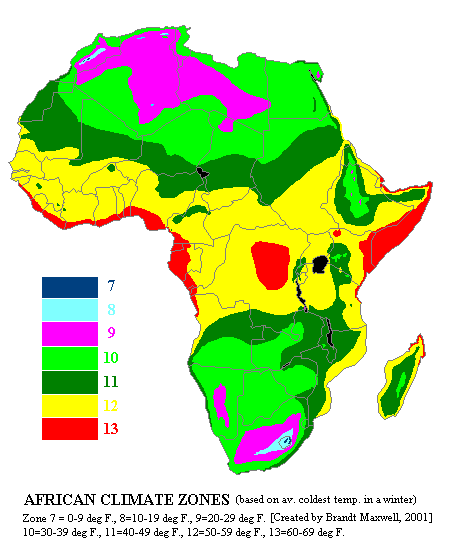It appears that you're running an Ad-Blocker. This site is monetized by Advertising and by User Donations; we ask that if you find this site helpful that you whitelist us in your Ad-Blocker, or make a Donation to help aid in operating costs.
▼ Sponsored Links ▼
▲ Sponsored Links ▲
▲ Sponsored Links ▲
Region Information Data for Africa
Africa is the world's second largest and second most populous continent, being behind Asia in both categories. At about 30.3 million km2 (11.7 million square miles) including adjacent islands, it covers 6% of Earth's total surface area and 20% of its land area. With 1.2 billion people as of 2016, it accounts for about 16% of the world's human population. The continent is surrounded by the Mediterranean Sea to the north, the Isthmus of Suez and the Red Sea to the northeast, the Indian Ocean to the southeast and the Atlantic Ocean to the west. The continent includes Madagascar and various archipelagos. It contains 54 fully recognised sovereign states (countries), nine territories and two de facto independent states with limited or no recognition. The majority of the continent and its countries are in the Northern Hemisphere, with a substantial portion and number of countries in the Southern Hemisphere.
Africa's average population is the youngest amongst all the continents; the median age in 2012 was 19.7, when the worldwide median age was 30.4. Algeria is Africa's largest country by area, and Nigeria is its largest by population. Africa, particularly central Eastern Africa, is widely accepted as the place of origin of humans and the Hominidae clade (great apes), as evidenced by the discovery of the earliest hominids and their ancestors as well as later ones that have been dated to around 7 million years ago, including Sahelanthropus tchadensis, Australopithecus africanus, A. afarensis, Homo erectus, H. habilis and H. ergaster - the earliest Homo sapiens (modern human), found in Ethiopia, date to circa 200,000 years ago. Africa straddles the equator and encompasses numerous climate areas; it is the only continent to stretch from the northern temperate to southern temperate zones.
Africa hosts a large diversity of ethnicities, cultures and languages. In the late 19th century, European countries colonized almost all of Africa; most present states in Africa originated from a process of decolonization in the 20th century. African nations cooperate through the establishment of the African Union, which is headquartered in Addis Ababa.
Posted on March 31st, 2019
Africa's average population is the youngest amongst all the continents; the median age in 2012 was 19.7, when the worldwide median age was 30.4. Algeria is Africa's largest country by area, and Nigeria is its largest by population. Africa, particularly central Eastern Africa, is widely accepted as the place of origin of humans and the Hominidae clade (great apes), as evidenced by the discovery of the earliest hominids and their ancestors as well as later ones that have been dated to around 7 million years ago, including Sahelanthropus tchadensis, Australopithecus africanus, A. afarensis, Homo erectus, H. habilis and H. ergaster - the earliest Homo sapiens (modern human), found in Ethiopia, date to circa 200,000 years ago. Africa straddles the equator and encompasses numerous climate areas; it is the only continent to stretch from the northern temperate to southern temperate zones.
Africa hosts a large diversity of ethnicities, cultures and languages. In the late 19th century, European countries colonized almost all of Africa; most present states in Africa originated from a process of decolonization in the 20th century. African nations cooperate through the establishment of the African Union, which is headquartered in Addis Ababa.
| Official Language(s) | 1250-3000 native languages |
| Approximate Size | Area: 30,370,000 km2 (11,730,000 sq mi) |
| Population | 1,225,080,510 (2016) |
| Sports | Fifty-four African countries have football (soccer) teams in the Confederation of African Football. Egypt has won the African Cup seven times, and a record-making three times in a row. Cameroon, Nigeria, Senegal, Ghana, and Algeria have advanced to the knockout stage of recent FIFA World Cups. South Africa hosted the 2010 World Cup tournament, becoming the first African country to do so. Cricket is popular in some African nations. South Africa and Zimbabwe have Test status, while Kenya is the leading non-test team and previously had One-Day International cricket (ODI) status (from 10 October 1997, until 30 January 2014). The three countries jointly hosted the 2003 Cricket World Cup. Namibia is the other African country to have played in a World Cup. Morocco in northern Africa has also hosted the 2002 Morocco Cup, but the national team has never qualified for a major tournament. Rugby is a popular sport in South Africa, Namibia, and Zimbabwe. |
Places in the Region: Africa
▼ Sponsored Links ▼
▲ Sponsored Links ▲
▲ Sponsored Links ▲
Comments
(Related Products
▼ Sponsored Links ▼
▲ Sponsored Links ▲
▲ Sponsored Links ▲



